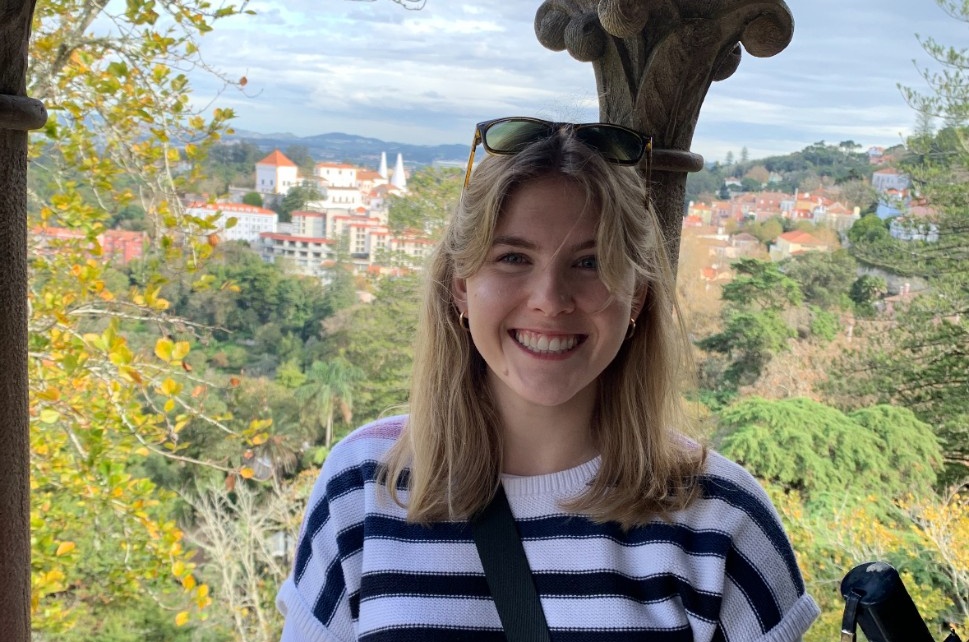OT roles in diverse areas of occupation
by Lil Crump
When tasked with writing an article that showcases the breadth of diverse roles within the OT profession, I wasn't quite sure where to start. Luckily, someone—thanks, Karen Landry—suggested contacting Abby Siddle, a recent graduate (Class of 2023) of Dal's MScOT program, to learn more about "The Bridge."

Abby Siddle, MScOT Class of 2023
The Bridge is an innovative integrated services shelter in Dartmouth, NS, providing on-site health support, immediate shelter, and a pathway to stable housing. The shelter provides wrap-around social and health support for unhoused individuals with on-site staff from Nova Scotia Health, Adsum House, VON, Northwood, MOSH, Welcome Housing, Pharmachoice, and hotel staff. The Bridge services support access and flow in hospitals to alleviate the hospital based systems.
The role of the Occupational Therapist at The Bridge encompasses a broad scope, including promoting independence in Activities of Daily Living (ADLs) and Instrumental Activities of Daily Living (IADLs), improving the safety of functional mobility, building routine and skills for community transition with a trauma-informed and harm reduction approach.
Fortunately, Abby could call on her experience from her first OT School placement at the Mobile Outreach Street Health (MOSH) team through the North End Community Health Center, which supports unhoused or precariously housed individuals. "I loved being creative with interventions and supporting folks in accessing health and social services to increase participation in daily life."
Abby collaborates with the client and team at The Bridge to determine housing and functional goals. "While at the shelter, we see folks engaging with health services and primary care for the first time in a long time to support managing complex comorbidities." Abby works with clients on required independent living skills and builds a routine for transitioning into the community. Once clients are housing-ready and transition into the community, Abby follows their progress for 3 months to ensure their environment is set up for their functional needs and that they have what they need to navigate their community and participate in meaningful occupations.
When asked if she runs into any barriers in her work, Abby shares that access to funding is often a significant barrier, especially for those over 65 who no longer meet the requirements for income assistance. Adaptive and ambulatory aids are expensive, and she relies heavily on QEII, Red Cross, and Easter Seals to fill these gaps. In addition, due to incredible stress on the mind and body when unhoused, clients are often aging ~10-15 years more than their chronological age. Therefore, access to programs with age cut-offs can require additional advocacy.
The occupational therapist role of supporting clients while living in the shelter is considered community-based care. Transitions involve an "all hands on deck" approach, where service providers and health team members work with the client to build skills for a sustainable transfer into independent community living or supportive living.
Clients supported at The Bridge may have had negative past experiences with the public health care system; therefore, it requires a slower approach to care to build rapport and hear the clients' stories and concerns to minimize harm. When working with a marginalized population, the team often advocates for clients in the hospital to ensure they are receiving the health services needed with a supportive approach and connecting folks with the mental health and addictions team if needed. Arguably, the most significant barrier is for clients who require long-term care support but are immediately disqualified if they use any substance, including alcohol and cannabis. This is a substantial gap in our health care system as, unfortunately, there are no other safe options for folks who are vulnerable to cognitive or physical impairments living with addiction.
The Bridge is a pilot project, so the potential and growth of the project and how it can support health and housing access for unhoused populations is what inspires Abby the most in her current role. "I feel our partnerships with service providers have been effective in making health and social services accessible, and I'm excited to see what the next steps for the project are! I thoroughly enjoy working with this community and learning from them; each day is different, which requires me to connect with other OTs and service providers and research to be creative with my approaches to care."
Abby expresses her gratitude for the wonderful placements she received at the School of OT, including MOSH and Acute Care. "My Community OT placements set me up well for this position," she shares. Abby admits that her biggest learning curve was maintaining boundaries with clients with complex mental health conditions and learning to share OT services' expectations (e.g., wait times, equipment, etc.) with clients and service providers to reduce the risk of burnout.
Outside of work, Abby enjoys cooking new recipes, gardening, spending time outside, and being with friends and family. "Work-life balance is incredibly important for any practice area - I can admit it can also be challenging. I maintain a work-life balance by learning to disconnect after work by doing things I enjoy to avoid "taking it home with me," having a great support network, and attending therapy to manage stress."
Click for more information about The Bridge Integrated Services Shelter.
